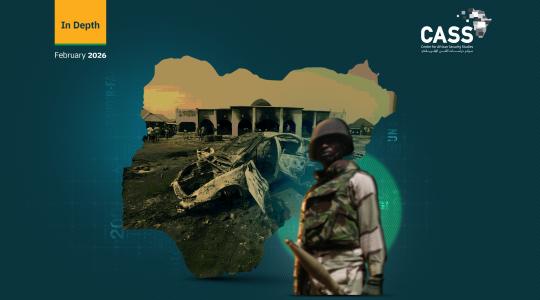In early February, a Turkish Bayraktar TB2 drone operated by Burkina Faso’s armed forces targeted an Islamic State group convoy in the northern province of Oudalan as it headed towards the border triangle region with Mali and Niger. The strike killed five members of the organization, including senior operatives, and destroyed several of their cars and motorbikes.
The Center for African Security Studies later learned that Harouna Oulel (also known as Abdel-Malick Al-Fulani), one of the most important commanders in the jihadist group’s so-called Sahel Province, was among those killed, as was Abu al-Darda al-Mauritani.
In early February, a Turkish Bayraktar TB2 drone operated by Burkina Faso’s armed forces targeted an Islamic State group convoy in the northern province of Oudalan as it headed towards the border triangle region with Mali and Niger. The strike killed five members of the organization, including senior operatives, and destroyed several of their cars and motorbikes.
The Center for African Security Studies later learned that Harouna Oulel (also known as Abdel-Malick Al-Fulani), one of the most important commanders in the jihadist group’s so-called Sahel Province, was among those killed, as was Abu al-Darda al-Mauritani.
It appears that Al-Fulani and those with him had underestimated the possibility that they would be targeted by drones, as the three-border region is almost completely under IS control. It would appear that the strike was either a regular operation against a jihadist convoy, or a precise strike based on information leaked from an IS operative or a source close to the commander. Abdel-Malick has been wanted since 2017 by the Burkinabe authorities, who in 2020 announced a reward of 150 million West African CFA francs—equivalent to $250,000—for information leading to his arrest.
The Context of the Strike
Since taking control of large areas around the border triangle between Burkina Faso, Mali and Niger, IS had been able to move relatively freely and appears to have eased security protocols that had reduced the number of commanders traveling together and meant they mainly travelled individually by motorbike. By contrast, the attack that killed Al-Fulani hit a truck carrying hundreds of rifles, grenades and many boxes of ammunition, which the organization was transporting areas its controls in northern Burkina Faso to its strongholds in the Malian state of Ménaka.
The importance of the strike lies in the fact that Fulani was a prominent IS fighter close to Adnan Abu al-Walid al-Sahrawi, who founded the group’s Sahel Province branch in 2015, and had recruited dozens of ethnic Fulani fighters from the region, helping bolster the jihadist group’s presence there.
Implications of the Assassination
IS has built its clout not solely on its leading figures, but rather on carefully established social ties and efforts to attract members in all the areas where it deploys. Its intense recruitment drives in many Fulani-dominated areas of in Mali, Burkina Faso and Niger therefore mean that the organization now has a deep-rooted presence in the region.
Accordingly, the killing of Al-Fulani and his associates will do little to curb the organization’s presence in the region, where it has steadily escalated its operations since 2017. IS will continue to pose a major threat to West Africa in general and the three-borders region in particular.




